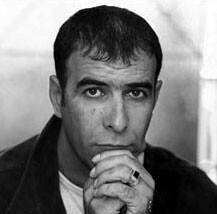The Daily Star 2 December 2005

Nizar Hassan
The film premiered in Lebanon earlier this month at Masrah al-Madina, presented by film co-operative Beirut DC and Zawaya Magazine.
Hassan’s central character is his deceased grandfather, Soud Abdel Kader, and at its most basic Karem Abou Khalil is the old man’s biography recollected by himself (thanks to a bit of discreet taping in 1977) and his four sons - Ahmad, Bahjat, Mohammad and Youssef.
The director aspires to a more complex film, though, and works with several narrative threads to achieve it.
The camera constantly returns to the motif of olive harvest at Karem Abou Khalil. Land and olive harvest are heavy with symbolic meaning in the Palestinian experience, of course, evoking lost land, disenfranchisement, diaspora.
Hassan doesn’t trade in easy symbols, though. By the end of the film, the scenes of him and his cousins striking olives from the trees seems less a symbol of Palestinian identity than a metaphor for the filmmaker’s labors to find his story.
The tone is set when he asks one of the brothers whether his grandfather had a dream. He did, he answers, it was to set up an olive-processing factory, one to produce olive oil and cosmetics for the luxury market.
The testimonies of Abdel-Kader and his sons confirm that, though family members held a few dunums of land, it wasn’t a dream of land and nationalism that collided with the Zionist project, but one of industry. Deliberately or not, this pre-empts a narrative arc that has become typical of the Palestinian experience.
To give the testimonies context, Hassan chats with Shlomo Tzur - a kibbutznik who migrated to northern Palestine from Romania in 1935. He recalls the same history as Hassan’s father and uncles, albeit rather differently.
The effect of the testimonies is to underline how Hassan’s family history falls outside the nexus of peasant-landlord/intellectual-fighter - the cast of characters that usually dominates the nationalist narrative.
During his 1977 testimony, the old man said he’d intended to emigrate to America. He ended up in Haifa, where he worked until forced to flee to the countryside to avoid Ottoman conscription. After buying his way out of the Ottoman Army, he took up trade.
He did well, being the only man in the village who could lease Karem Abou Khalil in cash, rather than leasing it as a sharecropper.
Later with the cooperation of Arab insurgents then fighting the British Army - “Arab gangs” in Tzur’s terms - he bought the olive grove outright. His passion remained in trade, though, and the brothers say he lost a fortune trying to run the olive processing plant and a second business geared to tobacco, flour and sweets. “He lost enough,” says Hassan’s father, “to buy dozens of dunums of land.”
After 1948 the family’s prospects declined. Abdel-Kader stopped working and his sons went to work for Israelis. The brothers’ version of their father’s frustrated aspirations moves uncomfortably alongside Tzur’s recollection that he and his fellow kibbutzniks “wanted your people to have a movement like ours, to establish industry in the Arab sector.”
The brothers confirm that the old man was discerning in matters of style. Before their decline, the family was obviously better off than others because they lived in a three-room stone house and the boys wore sandals.
When he married their mother, Abdel-Kader bought her dowry in Haifa - he considered Nazareth goods inferior - and she was the first woman in the village to wear a white wedding dress. This sense of chic brings Hassan to his third, and central, narrative thread.
His grandmother was once asked to pose in a photograph with then-Israeli Labor Minister Golda Meir, to mark the opening of a new road. As Hassan received the story, his grandmother had been asked to pose because she was the only woman in the village who could afford stockings. She later destroyed the image, he says, in shame.
The story of the destroyed photo is the premise for Hassan’s feigned quest to find another copy of the original, making inquiries at Israeli newspaper archives. He doesn’t find it but he does pull out some choice quotes from a now-defunct Arabic-language Israeli newspaper - an artifact of a time when some Zionists were bent on convincing Palestinians of Israel’s benevolence.
Then, Hassan announces, a week before shooting began, he discovered his grandmother’s photo with Golda Meir wasn’t destroyed. He panicked, he says, because the destroyed photo was his film’s premise. He then asks, mischievously perhaps, how it was that the story of his grandmother’s image could have become so altered from reality.
The photo features Meir standing in front of a phalanx of village women. In an above-the-knee skirt, her legs are prominently stocking-ed. All the women behind her - including, presumably, Hassan’s grandmother - are covered head-to-toe in hijab and jalabiyyeh. The camera zooms on the women’s feet, as if to discern whether one is actually wearing stockings. The image becomes more blurred and grainy the closer we come.
It’s the most effective moment of the film, the metaphor that best represents the challenge of recollecting the past - trapped between the variant versions and misrepresentations of personal and nationalist memory and the limits of documents whose focus is not the one we require.
Arguably the story of his grandmother’s photograph should have been the framing narrative for all the other contending stories in the film, and this zoom on an antique photo the film’s final image.
Hassan chooses to return to where he began, the matter of dreams. Asking the brothers if they have a dream, all but his father answer “no.” As fate would have it, though, the sound operator wasn’t recording his father’s voice when he spoke of his dream: another breach in the documentary record.
In any case, Hassan assures us, his father wanted to be a teacher.
Related links
This article was originally published by the Daily Star and is republished with permission



